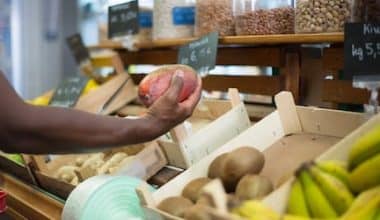Date palm planting in Nigeria is a lucrative agribusiness option that can net you millions of naira. Arab traders are thought to have brought the date palm to Nigeria in the early eighth century. As you can see, the history of date palms in Nigeria does not begin today. Date palm planting is more successful in northern Nigeria’s dry terrain. You should be aware that date palm cultivation is presently very successful and profitable in Nigeria. This thorough guide seeks to provide a detailed overview of Nigerian date palm farming business, including everything from cultivation to harvesting and commercialization in Nigeria.
What are Dates?
Dates are a sweet fruit that grows on date palm trees and is scientifically known as Phoenix dactylifera. They have a distinct chewy feel and are often used in cooking as well as as a natural sweetener. Dates are high in nutrients and provide a variety of health advantages, including improved digestion and brain function.
What is the Dates Farming Business in Nigeria?
Date farming is a type of agriculture in which date palms are grown for the production of dates. Date palms are primarily planted in arid places and flourish in hot, dry climates. Date palm agriculture has been done for hundreds of years and has been a major source of food and revenue for many African communities, including Nigeria.
Dates are a highly nutritious food that is abundant in vitamins, minerals, and antioxidants, according to research. Dates are employed in a variety of industries, including confectionery, bakery, and health food, in addition to their nutritional benefits. Date cultivation is thus a potentially viable economic enterprise in Nigeria and Africa.
Date farming yield varies based on factors such as climate, soil type, and irrigation in Nigeria and Africa. Date palms, on the other hand, can produce up to 100kg of dates per tree each year with correct care and maintenance. This means that a well-managed date farm with a large number of date palms can yield a significant amount of dates for both domestic and export consumption.
Overall, date farming is a profitable business opportunity for farmers in Nigeria and Africa, and it has the potential to greatly contribute to the region’s economic development with the correct tactics.
Benefits of The Dates Farming Business In Nigeria
Some of the advantages of date farming in Nigeria include:
- Employment prospects: Date farming gives job opportunities for people in rural areas, lowering unemployment rates.
- Income growth: Date farming may be a profitable business because there is a strong demand for dates around the world, which can boost farmers’ and the economy’s income.
- Export opportunities: Due to the global need for dates, farmers have the option to export to international markets, resulting in foreign exchange earnings for Nigeria and Africa.
- Increases rural economic growth: Date farming can boost rural economic growth, resulting in infrastructure development, more income, and a higher standard of living.
- Income diversification: Date farming is a great way for farmers to diversify their income and achieve financial stability.
- Enhances food security: Dates farming can increase food security in Nigeria and Africa by providing a source of food and nourishment for the population.
- Foreign investment: Date cultivation can attract foreign investment in Nigeria and Africa’s agricultural industry.
- Value addition: Value-added products such as date syrup, date paste, and other date-based products can boost date farming earnings.
- Conservation of soil and water resources: Date farming can be a sustainable farming approach because it takes less water than other crops, resulting in soil and water resource conservation.
- Rural development: Date farming can help rural people improve their standard of living by providing an alternative source of income.
- Boosts the economy: Date farming can raise agricultural earnings, resulting in an overall benefit in the economy.
- New market development: Date farming can lead to the creation of new markets, such as the production of organic dates, which can command significant premiums.
Types of Dates in Nigeria
Dates Farming Business in Nigeria uses many varieties of dates. Among the most regularly planted cultivars are:
- Ajwa Dates: These are excellent quality dates with a silky texture that are exceptionally tasty.
- Medjool Dates: These dates are recognized for their big size, sweet taste, and soft texture.
- Deglet Noor Dates: This date type is distinguished by its transparent hue, mild flavor, and semi-dry texture.
- Barhi Dates: These dates are recognized for their soft, creamy texture and caramel-like flavor.
- Halawi Dates: Halawi dates are soft and chewy with a caramel-like flavor.
- Khadrawy Dates: Khadrawy dates are smooth and juicy with a sweet flavor.
- Zahidi Dates: These are little semi-dry dates with a nutty flavor.
Each of these types has its own distinct traits and applications in the Date Farming Industry. Dates can be eaten fresh, dried, or utilized in a number of recipes, depending on the variety.
Why Date Palm Farming in Nigeria
You may be wondering why you should invest in date palm cultivation in Nigeria. The solution is simple: you will profit greatly from this incredibly profitable commercial crop in Nigeria. You should be aware that, despite the fact that Nigeria has a double harvesting season, we produce less than 20% of what is eaten in the country.
This means that more than 80% of Nigeria’s total date palm fruit consumption is imported. As you can see, there is a significant commercial opportunity in Nigeria’s date palm growing industry. According to Hamza Abdulhameed Mohammed, the man in charge of the date palm research institute in Dutse, Jigawa state, they have produced a variety of seedlings capable of making Nigeria the world leader in date palm output.
This is one more reason why you should get into the date palm growing business right now. You will be in a better position to benefit from the upcoming improved seedlings for your date farming business in Nigeria. Because the market in Nigeria is so large, your profits will be enormous.
Requirements for Starting Your Date Palm Farming in Nigeria
Certain factors must be in place for your date production in Nigeria to be successful. The date palm farming company necessitates a thorough understanding of the industry. This post will give you the necessary information to help you succeed in your date production in Nigeria. The essential prerequisites for successful date palm growing in Nigeria are listed below.
#1. Thorough business plan
You should not start a date palm farming business in Nigeria until you have a solid business plan. So, before you begin date production in Nigeria, make sure you have a business plan in hand. Your business plan will act as a roadmap for your date palm farming venture.
While developing your business plan, you will learn where to sell dates in Nigeria, where to buy dates in Nigeria, date palm growth zones in Nigeria, and so on. Your business plan will assist you in learning more about the date palm farming business.
The business plan will not only serve as your guide, but it will also assist you in obtaining financing to start your date palm farming firm. You must recognize that your date palm farming business plan is critical to the success of your venture.
#2. Land preparation and selection
You should prepare the land during the dry season, around two months before the rainy season begins. It is critical that you plow the soil well enough to ensure that it is sufficiently loosened. Although date palm thrives in a wide range of soil types, the soil type preferred is sandy loam soil rich in organic matter. You must choose land in the North East or North West for a twofold harvest in one year.
It is perfectly appropriate for you to begin your date palm farming venture in the North Central. The only drawback is that you will only be able to harvest once a year.
#3. Date planting/seed propagation
You should be aware that date palms are either male or female; so, your plant will require both to grow fruit. Starting your farming from seeds will be extremely risky because you will require both a male and female tree. This is because determining the gender of the trees will take years.
It is preferable to buy seedlings in the form of cuttings from existing palms because they are correctly identified based on their gender. Date palms are pollinated by wind rather than insects or birds, hence manual pollination is required to assure pollination.
Male date palms will develop pollen sheaths in the early part of the year. Once the female flowers begin to blossom, you must collect the pollen and sprinkle it over them. You can plant up to 150 dates on one hectare of ground, and divide them into 5 males and 145 females.
#4. Manure application and irrigation
For your date palm farming business in Nigeria, you can use organic or inorganic fertilizers. Manure should be applied before planting while the dates are growing, throughout fruition, and when they are ripe.
Although date trees do not require much water, you must water your date palms for two years while they are maturing. This will assist your date plants in producing fruit in due season.
#5. Pest and Disease Control in the Date Palm Farming Industry
Insects produce diseases, including Parlatoria date scale and Coconut rhinoceros beetle, while fungi cause Diplodia. Insecticides can be used to control insects, while the Bordeaux combination is used to combat fungus.
#6. Harvesting and storing
Traditional date palms mature and can be harvested in 6-7 years. However, hybrid saplings can take up to 4-5 years. Because dates do not ripen at the same time, you can pick them up multiple times during the season.
Dates can be stored for up to a year or more if you have an appropriate storage mechanism. Pests can infest your dates if you do not have an efficient storage method. After harvest, the ideal way to keep your dates is to hang them on a bunch of layers of wood-supported mesh wire in a well-ventilated room or store.
#7. Sell your gathered dates
You should look for purchasers before your date palm reaches harvesting age. Local supermarkets, malls, and commercial and local fruit drink production enterprises are excellent areas to begin. You may make a lot of money from date palm farming in Nigeria if you have a decent marketing approach.
What are the Challenges of Date Palm Production in Nigeria?
The principal obstacles to current output are a lack of better varieties, poor farm management, farmers’ incapacity to control and manage pests and diseases, poor harvesting, marketing, and processing, and a lack of skilled professionals working in R&D.
Can Dates Fruit Grow in Nigeria?
Yields are primarily grown in Kano, Jigawa, Kaduna, Katsina, Sokoto, Kebbi, Zamfara, Gombe, Borno, Yobe, Bauchi, Adamawa, and Taraba states in Nigeria. Although dates are mostly found in the country’s northern regions, beginning a date farming business in any part of Nigeria might be a lucrative venture.
What is the Local Name for Dates in Nigeria?
Dates are one of the most popular fruits among Nigerians. It is called as Dabino or Dabinu in Hausa and is primarily planted and cultivated in the country’s north.
Which Country is the Largest Producer of Date Palm?
According to UN Food and Agriculture Organization data, Egypt is the world’s largest producer of dates, producing around 1.7 million tonnes of tropical fruit in 2021 alone. With 1.6 million tonnes of dates, Saudi Arabia is second, followed by Iran with 1.3 million tonnes.
Do Dates Grow Dry?
Date trees require the same amount of water as willow trees, but they cannot withstand rain or humidity. That is why dates must be produced in the arid desert, where the average annual rainfall is less than 3 inches and summer temperatures can reach nearly 120 degrees.
To Sum It Up
Date palm farming has enormous potential for agricultural expansion and economic development in Nigeria. Nigerian farmers may utilize favorable weather conditions and fertile soils to cultivate high-quality dates with the correct knowledge, techniques, and support.
Nigeria may emerge as a key player in the global data industry by tackling difficulties and capitalizing on opportunities, hence increasing revenue creation and rural livelihoods.
- TOP 10 BEST SMALL BUSINESS MARKETING COMPANIES 2023 (Updated)
- Dates Farming: Best Beginners Guide 2023
- How To Start a Palm Wine Business In Nigeria
- Top 20+ Common Nigerian Foodstuffs 2023
- HARVEST TIME TRACKER: Harvest Software Reviews & Pricing 2023





